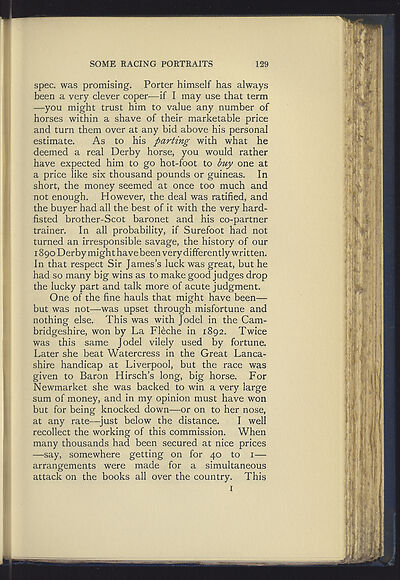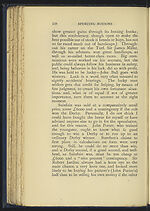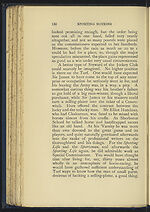Download files
Complete book:
Individual page:
Thumbnail gallery: Grid view | List view

spec. was promising. Porter himself has always
been a very clever coper—if I may use that term
—you might trust him to value any number of
horses within a shave of their marketable price
and turn them over at any bid above his personal
estimate. As to his
fiarting
with what he
deemed a real Derby horse, you would rather
have expected him to go hot-foot to
buy
one at
a price like six thousand pounds or guineas. In
short, the money seemed at once too much and
not enough. However, the deal was ratified, and
the buyer had all the best of it with the very hard-
fisted brother-Scot baronet and his co-partner
trainer. In all probability, if Surefoot had not
turned an irresponsible savage, the history of our
18go
Derby might have been very differently written.
In that respect Sir James's luck was great, but he
had so many big wins as to make good judges drop
the lucky part and talk more of acute judgment.
One of the fine hauls that might have been—
but was not—was upset through misfortune and
nothing else. This was with Jodel in the Cam-
bridgeshire, won by La Fleche in 1892. Twice
was this same J odel vilely used by fortune.
Later she beat Watercress in the Great Lanca-
shire handicap at Liverpool, but the race was
given to Baron Hirsch's long, big horse. For
Newmarket she was backed to win a very large
sum of money, and in my opinion must have won
but for being knocked down—or on to her nose,
at any rate just below the distance. I well
recollect the working of this commission. When
many thousands had been secured at nice prices
—say, somewhere getting on for
40
to (—
arrangements were made for a simultaneous
attack on the books all over the country. This
I
been a very clever coper—if I may use that term
—you might trust him to value any number of
horses within a shave of their marketable price
and turn them over at any bid above his personal
estimate. As to his
fiarting
with what he
deemed a real Derby horse, you would rather
have expected him to go hot-foot to
buy
one at
a price like six thousand pounds or guineas. In
short, the money seemed at once too much and
not enough. However, the deal was ratified, and
the buyer had all the best of it with the very hard-
fisted brother-Scot baronet and his co-partner
trainer. In all probability, if Surefoot had not
turned an irresponsible savage, the history of our
18go
Derby might have been very differently written.
In that respect Sir James's luck was great, but he
had so many big wins as to make good judges drop
the lucky part and talk more of acute judgment.
One of the fine hauls that might have been—
but was not—was upset through misfortune and
nothing else. This was with Jodel in the Cam-
bridgeshire, won by La Fleche in 1892. Twice
was this same J odel vilely used by fortune.
Later she beat Watercress in the Great Lanca-
shire handicap at Liverpool, but the race was
given to Baron Hirsch's long, big horse. For
Newmarket she was backed to win a very large
sum of money, and in my opinion must have won
but for being knocked down—or on to her nose,
at any rate just below the distance. I well
recollect the working of this commission. When
many thousands had been secured at nice prices
—say, somewhere getting on for
40
to (—
arrangements were made for a simultaneous
attack on the books all over the country. This
I
Set display mode to:
![]() Universal Viewer |
Universal Viewer | ![]() Mirador |
Large image | Transcription
Mirador |
Large image | Transcription
Images and transcriptions on this page, including medium image downloads, may be used under the Creative Commons Attribution 4.0 International Licence unless otherwise stated. ![]()
| Sports publications > Sporting notions of present days and past > (141) |
|---|
| Permanent URL | https://digital.nls.uk/231784535 |
|---|
| Description | More than 230 sports publications from the National Library of Scotland's collections. Featured sports include football, rugby, golf, shinty, athletics, bowls, cricket and hockey. Among the material from the late 19th and early 20th centuries are match programmes, club histories, and handbooks. From the late 20th century are promotional materials to encourage greater diversity in sport. Most items cover sports activities in Scotland. There are also publications relating to the Olympics and international matches. |
|---|---|
| Additional NLS resources: |
|

